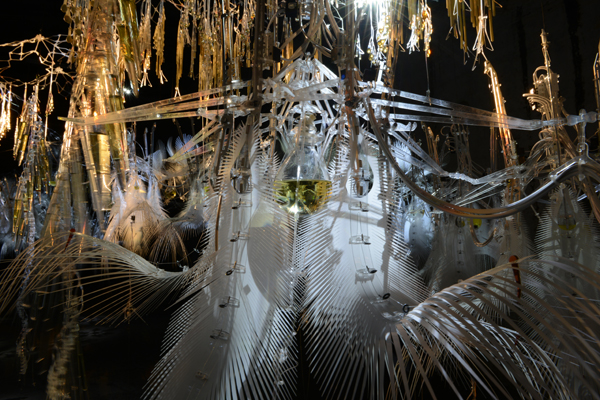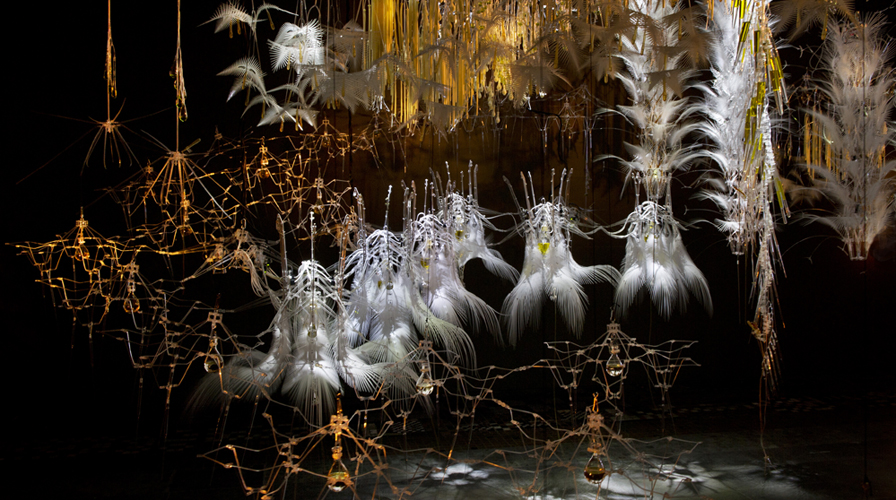PHILIP BEESLEY [CA]
Epiphyte Grove – Hylozoic series (2011 – 2012)
The Hylozoic Ground experimental architecture series developed by architect Philip Beesley has been expanded and refined by researchers, engineers and designers from around the world. It is an immersive, interactive environment that moves and breathes around its viewers, creating an environment that can ‘feel’ and ‘care’. Next-generation artificial intelligence, synthetic biology, and interactive technology create an environment that is nearly alive. This new technology has, according to the London Times, “the power to be the dominant aesthetic of 21st century landscapes.”
The Hylozoic Ground Project has amongst other been selected to represent Canada at the 2010 Venice Biennale in Architecture and the Sydney Biennale 2012, SYBIL.
Epiphyte Grove is commisioned by Meta.Morf 2012.
Artificially alive artwork tantalises and surprises!
Article in New Scientist, July 4, 2012, on Beesley @ the 18th Sydney Biennial (SYBIL).
What if the buildings around you were alive, and responded to your touch?
Hylozoism – the theory that everything is alive – is the philosophy behind Philip Beesley’s Hylozoic Series: Sibyl, an exhibit at the border of architecture and science fiction that is now on display in Australia at the 18th Biennale of Sydney.
Equal parts robotics, chemistry and prototypical architecture, the exhibit is a distributed network of interactive, moving and almost living elements. “I would say this is a work of sculpture and a work of architecture,” says Beesley, a Canadian artist and architect.
Bio
Philip Beesley is a professor in the School of Architecture at the University of Waterloo. A practitioner of architecture and digital media art, he was educated in visual art at Queen’s University, in technology at Humber College, and in architecture at the University of Toronto. At Waterloo he serves as Director for the Integrated Group for Visualization, Design and Manufacturing, and as Director for Riverside Architectural Press. He also holds the position of Examiner at University College London. His Toronto-based practice PBAI is an interdisciplinary design firm that combines public buildings with exhibition design, stage and lighting projects. The studio’s methods incorporate industrial design, digital prototyping, and mechatronics engineering. Philip Beesley’s work is widely cited in the rapidly expanding technology of responsive architecture. He has authored and edited eight books and appeared on the cover of Artificial Life (MIT), LEONARDO and AD journals. Features include national CBC news, Casa Vogue, WIRED, and a series of TED talks. His work was selected to represent Canada at the 2010 Venice Biennale for Architecture, and he has been recognized by the Prix de Rome in Architecture, VIDA 11.0, FEIDAD, two Governor General’s Awards and as a Katerva finalist. Beesley’s funding includes core CFI, SSHRC, NSERC and Canada Council for the Arts grants.
RESEARCH FOCUS: Responsive and distributed architectural environments and interactive systems, flexible lightweight structures integrating kinetic functions, microprocessing, sensor and actuator systems, with particular focus on digital fabrication methods and sheet-material derivations. Comprehensive architectural design and professional practice. textile structures; material crafts and fabrication; organicism and design integrated with nature; hybrid forms of nature. Emotion, romanticism and 20th century spiritualism as alternate qualities in Modernism; alterity and dissociation; chthonian and expanded definitions of space; the archaic. Current applied projects include solar-powered high-performance housing envelopes in exterior sites and architectural-scale geotextiles in museum spaces.
http://www.philipbeesleyarchitect.com/sculptures/index.php




 English
English